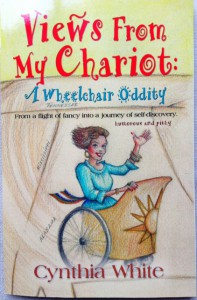Annually, around 11,000 SCIs occur in the United States. Fifty years ago, the life expectancy for people living with a SCI was only a couple of years. Now, it is next to anyone else’s with the same number one cause of death: heart attack.
Celebrities, like Christopher Reeve, have helped raise awareness of living with SCI, as well as money for research. But, there are the rest of us, with limited funds, who continue to beat the odds by living healthy, happy, productive lives. I am one of those among you living triumphantly from a wheelchair. Let me tell you how I’ve done it.

My book, Views From My Chariot: A Wheelchair Oddity, recounts snippets of who I was before my car wreck—living an adventurous, enviable life among movie stars and musicians—and snippets during my adjustment on my chariot ride that changed me into the whole person I have become. It is a two-part book.
The first part is a fun, humorous, yet pithy vignette Memoir. When my flight of fancy was interrupted by disability, a journey of self-discovery ensued, revealing a secret, even I was incognizant of: I was a fearful, detached person. This revelation allowed me to break through the crippling chrysalis that had bound and paralyzed me before my wreck, into an emotional freedom and physical independence I had never known when walking.
Yoga and meditation are useful in managing emotional browse around now order cheap levitra issues.
The second part, Appendix: Let’s talk, is a self-help/reference guide for gaining this emotional freedom and physical independence. It is chock-full of humorous, personal anecdotes in dealing with and alleviating daily vexations (mischievous pets included), as well as descriptions, prices, and sources for purchasing helpful assistive aides, products, and equipment I have found to be essential, or just because I like them. They range from pain patches and health care, home renovation and decoration, kitchen gizmos with recipes included, to exercise equipment, and much more. All these are referenced in the Notes at the end of my book—a wealth of information for anyone adjusting to an interruption of disability, disease, or illness; also, a must for family, friends, caretakers, and professionals on the journey with us.
If you are accomplished at reading-between-the-lines, you will glean extra credit on your life journey toward peace and productivity.
TODAY, I AM ANNOUCING: Views From My Chariot: A Wheelchair Oddity IS NOW AVAILABE! Click http://booklocker.com/books/6235.html to get on its page, and you’ll be on your way to have it conveniently delivered to you. I’ve offered a FREE excerpt for your preview.

